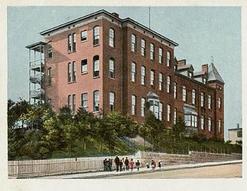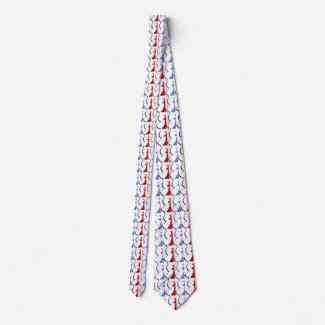-- Health - Overview: Hospitals and Health Care Facilities
|
Health
* Status * Hospitals * Insurance/HMOs * Medical schools * Consumer information * Economic impact |
* History
|
Hospitals
* Atlantic * Bergen * Burlington * Cape May * Cumberland * Essex * Gloucester * Hudson * Hunterdon * Mercer * Middlesex * Monmouth * Morris * Ocean * Passaic * Salem * Somerset * Sussex * Union * Warren  The German Hospital in Newark shown in postcard circa 1915-1930. Founded in 1868, it was renamed in 1952 in honor of Clara Maass, a former nurse who trained there and became the hospital's head nurse. Maass' 1901 death during yellow fever experiments attracted national attention. In 1956, the hospital relocated to a new building constructed in Belleville. The hospital is now a unit of the RWJBarnabas Health System. Image: University Libraries, University of Maryland The German Hospital in Newark shown in postcard circa 1915-1930. Founded in 1868, it was renamed in 1952 in honor of Clara Maass, a former nurse who trained there and became the hospital's head nurse. Maass' 1901 death during yellow fever experiments attracted national attention. In 1956, the hospital relocated to a new building constructed in Belleville. The hospital is now a unit of the RWJBarnabas Health System. Image: University Libraries, University of Maryland
-- Hospitals and health care systems Like the national healthcare industry, the New Jersey health system--once dominated by local community hospitals and independent sole practitioners into the 1960s--has undergone radical restructuring as institutions and providers have consolidated into larger networks. Much of the change has been driven by the need to compete under new reimbursement systems and performance standards established by health coverage reform, the federal Medicare program and private sector health insurers. New Jersey health systems, once resistant to entry into the state of out-of-state providers, also have forged alliances with prominent out-of-state systems in attempts to retain patients who previously left the state for treatment at prestigious hospitals in New York City and Philadelphia. In data published in 2024 by the New Jersey Hospital Association, there are 113 total hospitals in New Jersey, including specialty hospitals, with 72 acute care hospitals. New Jersey hospitals employ more than 150,000 individuals. Collectively, healthcare is the largest private sector employer in New Jersey and ranks second only to government as the state’s largest employment sector. New Jersey hospitals care for more than 15 million patients each year, with emergency departments providing care to some 4 million individuals annually., The state was reported to have 20,167 staffed hospital beds IN 2023 according to the American Hospital Directory. The largest acute care hospitals in staffed beds were Hackensack University Medical Center in Hackensack (803 beds); Morristown Medical Center in Morristown (729 beds); Saint Joseph's University Medical Center in Paterson (712 beds); Robert Wood Johnson University Hospital in New Brunswick (639 beds); Jersey Shore University Medical Center in Neptune (634 beds); Virtua Voorhees Hospital in Voorhees (587 beds); Cooper University Hospital in Camden (580 beds); and Cooperman Barnabas Medical Center in Livingston (554 beds). In March 2016, Barnabas Health--a seven-hospital system based in West Orange, and Robert Wood Johnson, a New Brunswick-based system with four hospitals--completed a merger combining their 11 acute-care hospitals to form New Jersey's largest health system with 32,000 employees, including 9,000 affiliated physicians and 1,000 residents and interns. The new nonprofit company named RWJBarnabas Health is the second-largest private employer in New Jersey behind only Wakefern Food Corporation, the parent corporation of ShopRite supermarkets. Some three months after the formation of RWJBarnabas Health, in July 2016, Hackensack University Health Network and Meridian Health merged to create the second largest system, Hackensack Meridian Health, with operations in seven New Jersey counties. The new network includes nine acute care hospitals, two children's hospitals and 120 other locations providing ambulatory care, surgical care, urgent care and assisted living services with 25,000 employees and nearly 6,000 physicians on staff. The Atlantic Health System based in Morristown is the third-largest system, with over 14,000 employees and $2.2 billion in annual revenue, comprised of Morristown Medical Center, Overlook Medical Center in Summit, Newton Medical Center, Chilton Medical Center in Pompton Plains, and Goryeb Children’s Hospital in Morristown.. The financial status of some hospitals, particularly those located in older cities with high proportions of charity care patients, remains fragile, and some have closed facilities, curtailed services or sold themselves to larger systems or for-profit firms. Hospitals also have broadened the range of their facilities through ownership of or alliances with rehabilitation centers, nursing homes, fitness centers and hospices. Hospitals operated as for-profit entities also have entered the New Jersey market, often provoking opposition over the higher rates charged for care. Some expanded operations of hospitals, such as in the ownership and rental of physician offices, are currently the subject of legal challenges, including pending litigation by the municipality of Morristown claiming that Morristown Medical Center should not be entitled to a property tax exemption as a nonprofit due to its revenues from for-profit physician practices. A court decision in favor of the municipality led to bills being introduced in the legislature to develop a compromise on the issue for all hospitals in New Jersey remain pending in the state legislature. * Individual Hospital Statistics for New Jersey, American Hospital Directory -- Hospital ratings and rankings In its 2023 rankings of the nation's "best hospitals," US News & World Report listed the following New Jersey hospitals as tops in the state, and their rankings: 1) Hackensack University Medical Center at Hackensack Meridian Health 2) Morristown Medical Center 3) Valley Hospital 4) Overlook Medical Center 5) Robert Wood Johnson University Hospital 6) Jersey Shore University Medical Center at Hackensack Meridian Health 7) Cooper University Health Care-Camden 8) AtlantiCare Regional Medical Center 9) Jefferson Health-Stratford, Cherry Hill and Washington Township 10) St. Joseph's University Medical Center The New Jersey Department of Health also publishes an annual Hospital Performance Report rating the state's hospitals on selected performance categories in patient safety, hospital-associated infections and treatment of cardiac, pneumonia and surgical care. The Leapfrog Group, a nonprofit established in 2000 by major national employers to improve information on hospital safety, quality, and efficiency based on comparative performance measures, conducts an annual survey to allow purchasers of health care to structure contracts and purchasing toward the highest performing hospitals and provide consumers with information on hospital safety and quality. New Jersey hospitals ranked fifth in the nation for successfully preventing errors in Leapfrog's most recent survey. In 2015, the Leapfrog's annual award recognizing hospitals in New Jersey exhibiting excellence through their performance on combined safety, quality and resource use standards was given to Englewood Hospital and Medical Center; Hackensack University Medical Center; Saint Barnabas Medical Center; Virtua Voorhees Hospital; and Children’s Specialized Hospital. The Dartmouth Atlas, which for the past 20 years has been comparing the cost and quality of healthcare around the nation, found in its most recent review that New Jersey is a high-cost state for hospital care, but isn't achieving commensurate health outcomes. Other ratings and rankings of hospitals are published by the federal Medicare program and private publishers such as Castle Connolly Medical Ltd. and Consumer Reports. * Nation's Best Hospitals 2023-2024, US News & World Report * Hospital Compare, Medicare * Hospital Performance Report, New Jersey Department of Health * Leapfrog Hospital Survey, The Leapfrog Group * Dartmouth Atlas of Health Care * Castle Connolly Top Hospitals --Economic impact Collectively, New Jersey acute care care hospitals accounted for over $130.6 billion annually in patient revenues, according to the most recent data of the American Hospital Directory. In its 2023 Economic Impact Report, the New Jersey Hospital Association, the trade association representing most of the state's hospitals, estimated that in 2021 hospitals accounted for
|
|
|
-- Nursing homes Medicare oversees annual inspections of nursing homes, which focus on health care and facility safety. Most of the deficiencies among New Jersey nursing homes were considered to be mild, with only 2% ranked among the most severe which could risk the health of residents. In 2020, over 200 deaths related to COVID-19 infections were reported at veterans nursing homes operated by the state government, which resulted in ongoing investigations and criticism of Governor Murphy's orders in the early weeks of the Pandemic that hospitalized nursing home residents be returned after discharge to their facilities. * Nursing Home Compare Database, Medicare * Nursing Home Search, NJ Spotlight * Health Care Association of New Jersey -- Marijuana dispensaries New Jersey enacted legislation in 2010 to allow the legal sale of marijuana for designated medical purposes. The legislation and its implementing regulations, however, were criticized as overly restrictive, thus preventing many potential users from participating. During his gubernatorial campaign, Phil Murphy endorsed expanding the medical marijuana program, as well as seeking legislative approval for recreational use. In Murphy's first year in office, the state increased the number of medical dispensaries. After a referendum on the November 2020 ballot approved amending the state Constitution to allow the sale and use of recreational marijuana and subsequent enabling legislation, a commission was created to develop regulations for the establishment of retail dispensaries, with the first dispensaries licensed in April 2022. As of 2024, there were more than 120 dispensaries throughout the 21 counties, with over $800 million in medicinal and recreational cannabis sales in 2023. *. Cannabis Regulatory Commission, State of New Jersey * Medical Marijuana Program, New Jersey Department of Health * New Jersey Medical Marijuana Law, NORML * Coalition for Medical Marijuana-New Jersey Health
* Status * Hospitals * Insurance/HMOs * Medical schools * Consumer information * Economic impact |
